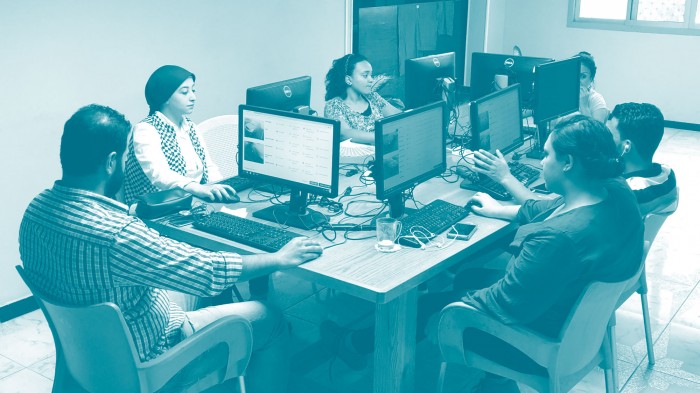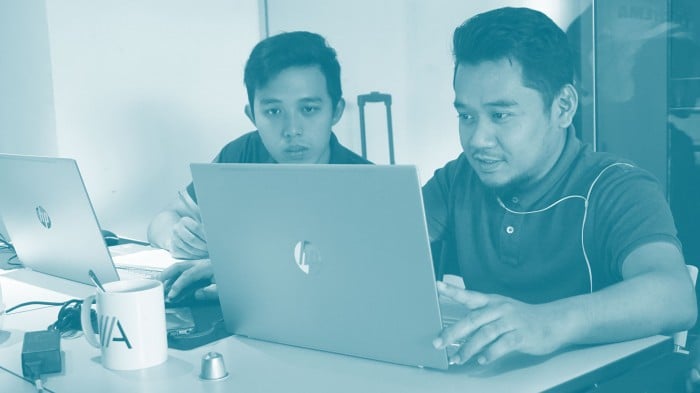These companies claim to provide “fair-trade” data work. Do they?

On a chilly New York afternoon in February, Leon Campbell hunkered down at his desk in an office in midtown Manhattan. He cued up a podcast about gaming and launched a software platform on his laptop. For the next few hours he clicked on the corners of vehicles in images, prompting the software to draw boxes around them.
By identifying pictures of cars and SUVs, Campbell and others were creating reams of data for training algorithms such as the ones in autonomous vehicles. It was monotonous work, said Campbell, who is 24 and autistic. Often it entailed “drawing boxes in similar positions and readjusting the boxes so that they are still around the object when they move a little bit out of frame.” Nonetheless, he was glad to have it. “It helps me prepare for future endeavors that I want to pursue,” he said, adding that he hopes to be a game programmer or designer.
A lot of human labor goes into building artificial-intelligence systems. Much of it is in cleaning, categorizing, and labeling data before AIs ingest it to look for patterns. The AI Now Institute, an ethics body, refers to this work as the “hidden labor” of the AI pipeline, “providing the invisible human work that often backstops claims of AI ‘magic’ once these systems are deployed in products and services.”
Campbell is a relatively privileged member of that labor pool. He works 28 hours a week for Daivergent, an online work platform designed to help autistic people get useful work experience and prepare for a career, and makes somewhere between $12 and $20 an hour. (Daivergent wouldn’t divulge his exact wage but said that was the company’s “typical range” and the “market rate” for New York City.)
By contrast, most people doing data annotation don’t work in Manhattan offices but from their homes in places such as India, Kenya, Malaysia, and the Philippines. They log in to online platforms for anywhere from a few minutes to several hours a day, perhaps distinguishing between bunches of green onions and stalks of celery or between cat-eye and aviator-style sunglasses. As detailed in the recent book Ghost Work by Mary Gray and Siddharth Suri, most of them are gig workers with low pay, insecure employment, and no opportunity for career advancement.
A small group of data annotation firms aims to rewrite that narrative. But these firms aiming to “do well by doing good” in AI data services are finding the path to enterprise enlightenment can be a rocky one.

A numbers game
Typically, data annotation workers log on to Amazon’s Mechanical Turk or gig-work platforms from data annotation companies like Appen. There they perform tasks contracted out by AI firms that pay the platforms slivers of a cent per minute. In the cutthroat competition for business, these platforms compete on scale, speed, and cost.
Appen, for example, boasts a pool of one million contractors who perform tasks such as categorizing medical images or translating text for chatbots. When the firm bought the data annotation provider Figure Eight for $300 million in March, the company explained that the purchase would help it meet clients’ “scale, speed and quality requirements.”
“It is really a race to the bottom,” says Daniel Kaelin, director of customer success at Alegion, a data annotation services company in Austin, Texas. “This whole industry is very, very competitive; everybody tries to find that little cheaper labor force somewhere else in the world.”
What does “impact” really mean?
Alegion is one of several platforms, including CloudFactory, Digital Divide Data (DDD), iMerit, and Samasource, that say they want to make AI data work dignified. They call themselves “impact” companies and claim to offer ethically sourced data labor, with better working conditions and career prospects than most firms in the industry. It’s like fair-trade coffee beans, but for enormous data sets.
However, there are no regulations and only weak industry standards for what ethical sourcing means. And the companies’ own definitions of it vary widely.
At iMerit, for instance, people who have worked at the company for several years have moved up the ladder to serve as team leads, project managers, and domain trainers, says Radha Basu, the company’s cofounder and CEO. The firm has 2,300 full-time employees, most based in India; half are women, who can get up to six months of maternity leave. iMerit formed in 2012 as a double-bottom-line for-profit company, meaning it measures itself on social-impact metrics, such as inclusion and diversity, as well as traditional fiscal ones.
People in Kenya and Uganda working for data services provider Samasource also have full-time jobs with benefits such as health care, pensions, subsidized meals, and 90 days of maternity leave. DDD, meanwhile, hires low-income youth, rural migrants, and “urban slum dwellers”—at least 50% of whom are women—to perform digital tasks for six to eight hours a day, according to a 2018 company report. The firm pays for some education and helps its employee “associates” move on to jobs elsewhere.
Alegion and CloudFactory, by contrast, both offer mainly hourly contract work—the norm among data annotation firms—rather than full-time employment. CloudFactory says 79% of its “cloud workers” report that the company is their primary source of income, up from 28% in 2015. For Alegion, though, “a lot of it is viewed as supplemental income rather than primary income,” says Alegion’s CEO, Nathaniel Gates. “It’s not a career for them.”
Troy Stringfield, who took over as Alegion’s global impact director in 2018, defends the “impact” label—which the seven-year-old company has adopted only in the past year or so—by saying impact means creating work that improves people’s lives. “It’s going in and saying, ‘What is a livable wage? What is getting them better than where they’re at?’” he says.
But Sara Enright, project director at the Global Impact Sourcing Coalition (GISC), a member-funded industry body, says it’s doubtful that such work should be called impact sourcing: “If it is solely gig work in which an individual is accessing part-time wages through an hour a day here and there, that is not impact employment, because it does not actually lead to career development and ultimately poverty alleviation.”
CloudFactory, DDD, iMerit and Samasource (but not Alegion) are all members of GISC, which has established an “impact sourcing standard.” It defines minimum requirements and voluntary best practices for employment that “improves the lives of people who otherwise have limited prospects for formal employment.” The organization, founded in 2016, requires its members’ performance on nondiscrimination, equal pay, and other criteria to be assessed every two years.
Yet GISC members aren’t penalized or kicked out if they don’t pass the assessment. The companies also vary in how much they publicly report. Samasource, for example, publishes impact audits reporting workforce demographics, the number of people “moved out of poverty,” and more. DDD’s annual reports include data showing employees’ average monthly earnings and estimated increase in lifetime income.
CloudFactory, on the other hand, published a social impact report in 2015 but has not put one out since. The company told MIT Technology Review it reports impact metrics annually to the Rockefeller Foundation, an investor in the firm. Meanwhile, iMerit said that as a for-profit firm, it doesn’t publish such reports, while Alegion said it has “broad targets it wants to meet” but didn’t provide specific metrics.
Getting into the US market
In their bid to expand, companies like Alegion and iMerit are also trying to build a pool of data workers in the US, drawing on underprivileged and marginalized populations there. That gives them lucrative access to government, financial, and health care clients that demand stringent security measures, work with regulated medical and financial data, or need the work done in the US for other legal reasons.
To recruit those US workers, the impact firms can go through companies like Daivergent, which serves as a conduit to organizations such as the Autism Society and Autism Speaks. (That’s where Campbell, whom we met earlier drawing boxes around cars, works.) Alegion also did a trial using workers provided through IAM23, a support group for military veterans.
But trying to bring a model based on overseas outsourcing to the US presents a problem. “You still need to have the inexpensive labor,” says Alegion’s Stringfield.
iMerit, too, has had trouble growing its US workforce. When the company set up shop in New Orleans last year, promising 100 new jobs, Mayor Mitch Landrieu publicly congratulated it. But after more than a year, the company has just 30 full-time employees in the city. To get to 100 it needs more client contracts, says Jai Natarajan, the company’s head of marketing.
Part of the company’s pitch is that it isn’t just providing cheap commodity gig work but something quite specialized. In June, for example, iMerit’s Basu was in New Orleans helping develop a training program for workers doing a type of image analysis that can take as long as 45 to 90 minutes per task. “People look at impact sourcing and assume that people who come from poor backgrounds do only the lowest-level labeling. That’s quite inaccurate,” Basu says. But the race-to-the-bottom pricing in the data labeling industry helps reinforce a general perception that the work is simple and should be cheap. That makes iMerit’s claim—that its services require higher skills—a hard one to sell.
Competing with mainstream for-profit firms has also been tough for Samasource, which Leila Janah launched as a nonprofit 11 years ago. A self-proclaimed “total social-justice kind of nerd” who has given talks at SXSW, several TedX events, and the IMF’s 2016 annual meeting, Janah wrote a 2017 book, Give Work: Reversing Poverty One Job at a Time. After launching her fair-trade luxury skincare brand LXMI, Janah was featured in the glossy pages of Vogue in 2018, alongside fashion designers, models, a pair of sibling ice dancers, and others who are “effecting change and leading conversations wherever their careers take them.”
Despite her prolific efforts, Janah says, Samasource didn’t stand a chance against for-profit startups. “We were basically going to be screwed over by all these companies …with zero interest in ethics or paying fair wages but raising $20 million of VC money to build training data with, like, basically an anonymous crowd labor force,” she says.
So she switched to a hybrid model in which the founding nonprofit owns the majority of the shares in a for-profit company that can raise capital from investors. It’s an increasingly common model for social entrepreneurs in areas like microcredit, health care, and job training.

But it came with a compromise. Samasource decided that to woo investors, it had no choice but to give them voting rights. “There’s no investor that would otherwise invest in a company where a nonprofit board was kind of dictating the outcomes,” says Janah. She says her board “felt the risk of investors’ stripping away Samasource’s impact model was very low,” and she wouldn’t elaborate on whether the investors have actually taken any decisions that weakened it.
Impact-washing?
With no standards for reporting and no third-party validation, we have to take the firms’ word for it that what they are doing isn’t just marketing gimmickry, or what some call “impact-washing.”
“It’s right to question when a company says without a lot of qualifications, ‘Look at the impact that we’re achieving through just providing good jobs,’” says Enright. “Just growing a business in a developing country does not necessarily make it an impactful enterprise, just because it’s offering good jobs to people who otherwise wouldn’t have those jobs.”
Unlike with fair-trade goods, there is little public pressure on the companies to be honest, because they provide their services to businesses, not directly to consumers. “Consumers can value ethical sourcing—for example, at Patagonia and various consumer brands—and you kind of buy into that as a consumer,” says iMerit’s Natarajan. But “it remains to be seen what ethical sourcing means in the b-to-b sector.” As a 2014 issue of Pulse, an outsourcing industry magazine, noted, companies would have to make a choice to use impact-conscious labor providers. Without laws or public pressure it’s not clear what can impel them to make such a choice, and without standards and accountability, it’s not clear how they should evaluate the providers.
In the end it may be only regulation that changes labor practices. “There is no way to change employment from the inside of markets. Yes, they’re doing everything they can, and that’s like saying I’ve got a bicycle with no pedals, and I’m doing everything I can to ride it as quickly as this thing is built to go,” says Gray, the Ghost Work coauthor. “There is no organizing of the rights of workers and fair employment without involving civil society, and we haven’t done that yet.
Kate Kaye is a freelance journalist and founder of the AI ethics reporting site RedTail.
Deep Dive
Artificial intelligence
Large language models can do jaw-dropping things. But nobody knows exactly why.
And that's a problem. Figuring it out is one of the biggest scientific puzzles of our time and a crucial step towards controlling more powerful future models.
Google DeepMind’s new generative model makes Super Mario–like games from scratch
Genie learns how to control games by watching hours and hours of video. It could help train next-gen robots too.
What’s next for generative video
OpenAI's Sora has raised the bar for AI moviemaking. Here are four things to bear in mind as we wrap our heads around what's coming.
Stay connected
Get the latest updates from
MIT Technology Review
Discover special offers, top stories, upcoming events, and more.